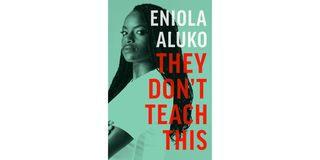How Eniola Aluko stood up to her racist coach

The cover of Eniola Aluko's memoir, They don't teach this.
What you need to know:
- Racism is a complex issue, with its subtleties are often overlooked.
- It is harder to deal with covert racism devoid of aggressiveness.
Eniola Aluko is a British-Nigerian former professional footballer, with mercurial technical ability.
At 17, she became one of the youngest England national team debutantes and was named England's women's young player of the year in 2003. She scored 33 goals for the women's team in 102 appearances.
At the club level, she played for Birmingham City, Charlton Athletic and Chelsea FC in the Football Association's Women’s Super League. She also spent three years playing in the US for St Louis Athletica, Atlanta Beat and Sky Blue FC in the American National Women's Soccer League.
She returned to England in 2012 and signed for Birmingham FC and Chelsea for second stints. In 2018, she accepted an offer from Turin-based Italian giants Juventus and was instrumental as the team won the Italian Serie A (Scudetto) title in 2019.
Due to her attention to detail, Eniola became the first female pundit on the famous football show Match of the Day on BBC. She is an ambassador for UN Women and has a weekly football column with The Guardian. She also holds a first-class honours degree in law from Brunel University, London, and is the sporting director for US club Angel City FC.
Her memoir, They Don't Teach This, captures the agonising racial discrimination she repeatedly experienced while playing for the England national team. The team was under the tutelage of Welshman Mark Sampson, a bigot. She narrates FA's failure to protect her and dismiss Mark and his intolerant colleagues.
On March 7, 2016, England was to play Germany in a friendly match. Every player could invite five guests to the game, and a couple more to the after-party. Eniola's father and uncle were scheduled to attend. They were to fly in from Lagos, Nigeria. Mark approached Eniola during dinner at the team hotel next to Wembley Stadium and said: "Make sure they don’t come over with Ebola.”
It was only later that evening, back in her hotel room, that the demeaning jab began to hurt. To suggest that her family was a carrier of a catastrophic disease was disdainful. If he had been following the news, the coach would have known Guinea was the epicentre of the epidemic, and not Nigeria.
The two countries are as far apart as Greenland is from Mark’s homeland of Wales. Nigeria had experienced only seven Ebola-related deaths and had been officially free of the virus for several weeks.
Mark wouldn't have said that to a white player from Africa. It was one of the few times in Eniola's life that she came face to face with disgraceful treatment due to her race. Occasionally, it crossed her mind that the coach disliked her but she had not concluded that he was racist.
Complexity
Racism is a complex issue. Its subtleties are often overlooked. It is harder to deal with the kind of racism that Mark displayed, as it is covert and devoid of aggressiveness. It's difficult to call that kind of racism out, hence the need to emphasise that it is a result of entrenched negative racial stereotypes.
If Eniola was a conformer, she would have been less sure of herself and projected an insecure, apologetic black girl seeking Mark’s approval. She might have had an easier interaction. Instead, she challenged stereotypes and stood up to him. Mark responded by benching her during matches.
The only comparable incident in Eniola's life arose at school when a career adviser was sceptical about her chances of becoming a lawyer. Eniola had excellent grades, but the image of a lawyer the white career adviser had in her mind was not of the black girl in front of her. Until then, she had been pleasant to Eniola. But suddenly, she resorted to racial indignation tantamount to dehumanisation.
The career adviser had bought into the entrenched stereotype that black girls were not cut out for the law profession. In her mind, the high achievements of black girls were pigeonholed to mediocrity.
If Eniola had mentioned that she wanted to be a nurse, she presumably would have tolerated it, as it was common to see African women working as nurses in England.
Mark interacted well with other black players during the 2015 Women's World Cup qualifiers, but they were not top scorers like Eniola.
Furthermore, they were not scholarly – and had no first-class law degree. They were conformers who could not dare question Mark or his staff, as was the case with Eniola. They were also not explicitly black and had no African names like Eniola Aluko.
Jeff Anthony is a novelist, a Big Brother Africa 2 Kenyan representative and founder of Jeff's Fitness Centre @jeffbigbrother





